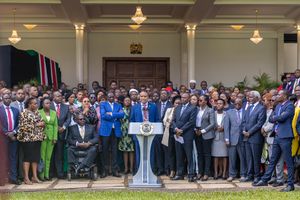
Protesters during Anti-Finance Bill demonstrations in Nairobi on June 18, 2024.
The government has bowed to public pressure and backtracked on some of the punitive taxes and levies that had been proposed in the Finance Bill, 2024.
Bread lovers, motor vehicle owners, pensioners and farmers are among the biggest winners in changes that Members of Parliament made to the Bill, which, overall, has attracted public outcry and condemnation.
But even as legislators aligned to President William Ruto’s Kenya Kwanza Alliance softened their hardline stand on the Bill at a joint Parliamentary Group (PG) at State House, Nairobi, wananchi took to the streets to protest against the Bill.
The police lobbed teargas at protestors who engaged the law enforcers in running battles for the better part of the day. The protests dubbed “Occupy Parliament” are aimed at pressuring lawmakers not to pass the Bill.

Police officers arrest a protestor along Kimathi Street on June 18, 2024 during the Occupy Parliament Protests against the Finance Bill 2024.
At the same time, the opposition demanded a total overhaul of the controversial Bill after a joint PG meeting held at County Hall in Nairobi last evening.
They accused the government of playing mind games with Kenyans.
National Assembly Leader of Minority Opiyo Wandayi, who read the PG’s statement, said the removal of the outrageous proposals in the Bill were not done in good faith but due to tremendous pressure from members of the public and the opposition.
Azimio questioned the wisdom behind taxing bread, motor vehicle and sugarcane among others.
“There was never any justification for proposing to increase tax on bread. There was no good whatsoever in proposing to tax sugarcane being delivered to factories,” said Mr Wandayi.
The National Assembly Committee on Finance and National Planning chairperson Kuria Kimani yesterday announced the changes made to the Bill at State House.
He said the proposal to charge 16 percent Value Added Tax (VAT) on bread had been dropped.
“We must protect Kenyans from increased cost of living and, therefore, the 16 percent VAT proposed on bread has been dropped. To further ensure the cost of living is reduced, tax on edible oil has been dropped,” stated Mr Kimani.
Also struck out is the proposed VAT on transportation of sugar cane, financial services and foreign exchange transactions.
“There is no increase in the cost of mobile money transfer, a service that is used by many Kenyans,” said Mr Kimani.
At the same time, money that is deducted from salaried employees' payslips for the Housing Levy and the Social Health Insurance Fund (SHIF) will be excluded from the amount subjected to Pay As You Earn (Paye) tax.
National Assembly Leader of Majority Kimani Ichung’wah also weighed on the matter.
“The Housing Levy, SHIF and the National Social Security Fund (NSSF) have been proposed to be tax deducible, that will ensure that what you will be subjected to as Paye will be an amount less than what was there before,” Mr Ichung’wah, who is also the Kikuyu MP, said.
“There will be more disposable income for Kenyans. We want to encourage a culture of saving and investment. Kenyans need to start saving for post-retirement,” he added.
Mr Kimani said that only imported eggs, onions and potatoes will be subject to excise duty, as the proposed Eco Levy is modified to only apply to imported finished goods.
“It is crucial to point out that Eco Levy will be imposed only on imported finished products and not locally manufactured ones. This will help boost Kenya's manufacturing capacity, create jobs and save foreign exchange,” said Mr Kimani.
The Molo MP noted that locally manufactured products such as sanitary towels will not attract the Eco Levy. This is a big win for women and girls.

A protester during anti-finance bill demonstrations on Moi Avenue, Nairobi on June 18, 2024.
Other products that are exempted from the levy are diapers, phones, computers, tyres and motorcycles.
On the proposed motor vehicle tax, Mr Kimani said that although the money was aimed at maintaining roads, the leaders listened to the concerns of the people.
“We have agreed that the motor vehicle tax cannot be amended through the Income Tax Act and also pegging it on insurance would cripple the insurance business and make it difficult especially for Kenyans who take third party insurance. That proposal has been dropped,” he stated.
President Ruto chaired the Kenya Kwanza PG meeting where he rallied his troops to back the plan to finance his ambitious Sh3.9 trillion budget for the 2024/25 financial year.
As he sought to calm protestors, Mr Kimani said that the report on the Bill that will be tabled on the floor of the House by the Committee on Finance and National Planning will be substantially different from the original one.
Mr Ichung’wah called on Kenyans to remain peaceful as their views had informed most of the changes made to the Bill.
“To the public-spirited Kenyans who had intended to occupy Parliament, there is absolutely no debate today,” Mr Ichung’wah said, noting that the debate would start today morning.
“The threshold for VAT registration has been increased from Sh5 million to Sh8 million. This, therefore, means that many small businesses will no longer need to register for VAT,” he said.
Mr Ichung’wah noted that the responsibility for electronic invoicing — ETIMS, which was recently introduced by Kenya Revenue Authority (KRA), has been removed for farmers and small businesses with a turnover of below Sh 1 million.
Excise duty, he said, will also be imposed on imported table eggs, onions and potatoes to protect local farmers.
“Excise duty on alcoholic beverages will now be taxed on the basis of alcohol content and not volume. The higher the alcohol content the more excise duty it will attract. Consequently, alcohol manufacturers are expected to make safer and cheaper alcohol,” Mr Ichung’wah said.
The pension contributions exemption will also be increased from Sh20,000 per month to Sh30,000.
The Kenya Kwanza PG was also informed that adequate cash —Sh18 billion — has been provided for the employment of all 46,000 Junior Secondary School teachers who are on internship.
“Funds have also been provided to hire 20,000 interns next month. The policy is now to transition teachers from internship to permanent and pensionable terms,” he said.
President Ruto, in his address to the legislators, said that the Executive and the Legislature will continue making the right decisions for the sake of Kenyans.
He pointed out that last year’s proposal in the Finance Bill 2023 have led to tremendous progress and further commended national institutions for working effectively in a democratic Kenya.
Mogotio MP Reuben Kiborek, lauded the changes.

A protester displays posters in a cloud of teargas during anti-finance bill demonstrations on Moi Avenue, Nairobi on June 18, 2024.
“The government has tried to cushion Kenyans. It is not fair to import eggs and onions yet we have them,” he said.
However, Matungulu MP Stephen Mule took a swipe at his Kenya Kwanza colleagues, saying they have abrogated the legislative role by taking instructions from the Executive.
He also said that Kenyans have been bombarding MPs’ phones with short messages, expressing their outrage over the Bill and urging them to reject it.
“I have received over 30,000 messages and close to a million on Tik Tok from Kenyans on the Bill,” Mr Mule said.






